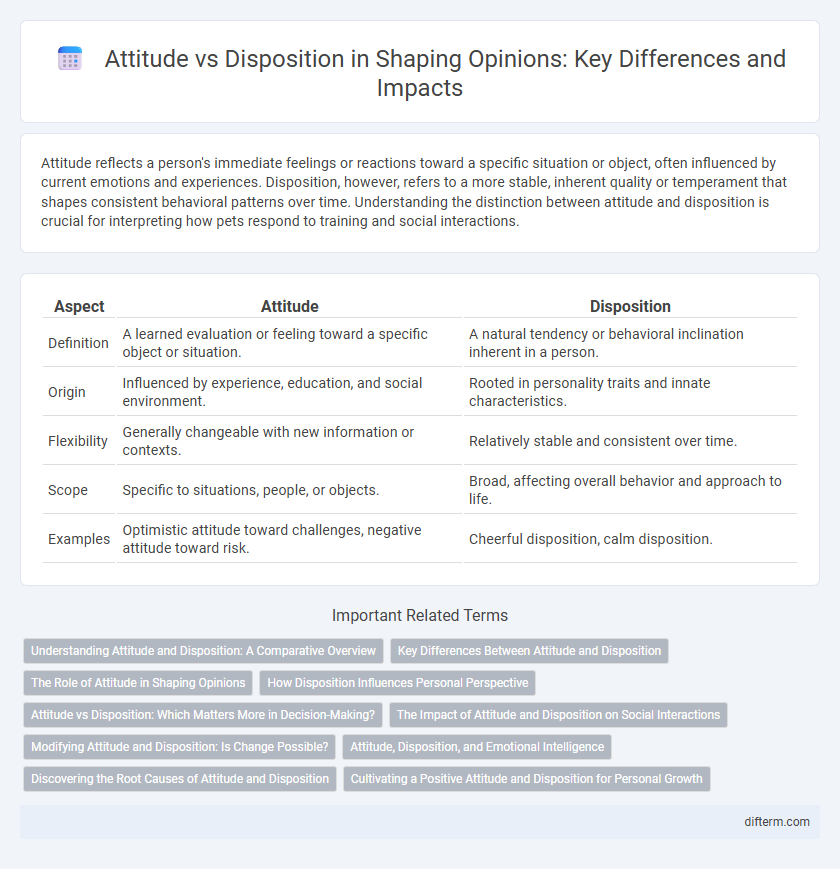Attitude reflects a person's immediate feelings or reactions toward a specific situation or object, often influenced by current emotions and experiences. Disposition, however, refers to a more stable, inherent quality or temperament that shapes consistent behavioral patterns over time. Understanding the distinction between attitude and disposition is crucial for interpreting how pets respond to training and social interactions.
Table of Comparison
| Aspect | Attitude | Disposition |
|---|---|---|
| Definition | A learned evaluation or feeling toward a specific object or situation. | A natural tendency or behavioral inclination inherent in a person. |
| Origin | Influenced by experience, education, and social environment. | Rooted in personality traits and innate characteristics. |
| Flexibility | Generally changeable with new information or contexts. | Relatively stable and consistent over time. |
| Scope | Specific to situations, people, or objects. | Broad, affecting overall behavior and approach to life. |
| Examples | Optimistic attitude toward challenges, negative attitude toward risk. | Cheerful disposition, calm disposition. |
Understanding Attitude and Disposition: A Comparative Overview
Attitude refers to an individual's learned tendencies to respond positively or negatively toward certain ideas, people, or situations, shaped by experiences and beliefs, while disposition denotes a person's inherent qualities or habitual tendencies influencing their behavior consistently across contexts. Understanding attitude involves examining specific evaluative responses adaptable to change, whereas disposition reflects enduring personality traits that underlie consistent behavioral patterns. Both concepts play crucial roles in psychology by explaining how temporary perceptions and stable characteristics drive human actions.
Key Differences Between Attitude and Disposition
Attitude refers to an individual's learned evaluation or feeling toward a specific object, person, or situation, often shaped by experiences and social influences. Disposition represents a more stable, inherent tendency or personality trait that predisposes a person to respond in certain ways across various contexts. Key differences include attitude's situational variability versus disposition's consistency, as well as attitude's cognitive and affective components compared to disposition's broader behavioral inclination.
The Role of Attitude in Shaping Opinions
Attitude plays a crucial role in shaping opinions by influencing how individuals interpret information and respond to experiences. It acts as a mental filter, guiding judgment and decision-making processes in various contexts such as politics, consumer behavior, and social interactions. Understanding the cognitive and emotional components of attitude provides insight into why opinions form and persist over time.
How Disposition Influences Personal Perspective
Disposition fundamentally shapes personal perspective by predisposing individuals to interpret experiences through consistent patterns of thought and emotion. This underlying tendency influences cognitive biases, affecting judgment and decision-making within various contexts, such as social interactions or problem-solving scenarios. Understanding disposition reveals why people react differently to similar situations, emphasizing its role in forming stable opinions over time.
Attitude vs Disposition: Which Matters More in Decision-Making?
Attitude influences decision-making more directly as it shapes immediate responses and judgments, reflecting current emotions and beliefs. Disposition, a deeper and more stable trait, subtly guides long-term behavior patterns but may not always dictate specific choices. Understanding the dynamic interplay between attitude and disposition reveals that attitude often plays a more critical role in shaping moment-to-moment decisions.
The Impact of Attitude and Disposition on Social Interactions
Attitude shapes immediate reactions and behaviors in social interactions, influencing how individuals perceive and respond to others in various contexts. Disposition represents a more stable, enduring trait that governs consistent patterns of social behavior over time, affecting long-term relationships and social cohesion. The interplay between attitude and disposition ultimately determines the effectiveness of communication, empathy, and conflict resolution in social environments.
Modifying Attitude and Disposition: Is Change Possible?
Modifying attitude and disposition involves shifting deep-seated mental frameworks that govern behavior and perception, often requiring conscious effort and sustained practice. Psychological studies suggest that while attitudes, being more flexible and context-dependent, can change through targeted interventions such as cognitive restructuring or exposure to new experiences, dispositions--rooted in personality traits--are more resistant but not immutable. Neuroplasticity research supports that meaningful change in disposition is possible over time, emphasizing the importance of intentional behavior modification and reflective self-awareness for lasting transformation.
Attitude, Disposition, and Emotional Intelligence
Attitude shapes how individuals respond to various situations, reflecting their learned beliefs and feelings, while disposition indicates a more inherent, stable personality trait. Emotional intelligence enhances the ability to manage and adapt one's attitude effectively, fostering better interpersonal relationships and self-awareness. Understanding the interplay between attitude, disposition, and emotional intelligence is crucial for personal growth and social success.
Discovering the Root Causes of Attitude and Disposition
Attitude often stems from conscious beliefs and experiences, while disposition reflects deeper, often innate personality traits shaped by genetics and early environment. Identifying the root causes of attitude involves examining external influences and personal choices, whereas understanding disposition requires exploring biological and psychological foundations. Analyzing these distinctions helps in tailoring interventions for behavior change and personal development.
Cultivating a Positive Attitude and Disposition for Personal Growth
Cultivating a positive attitude and disposition significantly enhances personal growth by fostering resilience, optimism, and emotional intelligence. A positive attitude reflects momentary responses to situations, while a disposition represents a consistent, ingrained mindset that influences long-term behavior and decision-making. Developing both helps individuals navigate challenges effectively, build strong relationships, and achieve greater overall well-being.
attitude vs disposition Infographic

 difterm.com
difterm.com